When 13 Moroccan men jumped from a speedboat into the sea and ran onto Sotillo beach in the southern Spanish resort of Castell de Ferro, video footage of them arriving seemed pretty unremarkable.
What happened next, however, was extraordinary.
For, as the unwelcome visitors from north Africa tried to make a run for it, they were rugby tackled to the ground by ordinary holidaymakers in swimming trunks – and held until police arrived to arrest them.
Now the Daily Mail can reveal that the nine men who were detained by irate beach goers were immediately whisked off to a police station before being moved to a notoriously inhospitable secure unit.
In stark contrast to how migrants are welcomed to UK shores with four-star hotel stays at taxpayers’ expense, the no-nonsense Spanish approach to illegal immigration means the men face being returned to Morocco within a matter of weeks.
Unlike British arrivals who are free to come and go from their accommodation, the group in Spain are effectively being held behind ten-foot fences surrounded by floodlights and security cameras in the Centre for Migration and Repatriation, known as a CATE, which opened in April this year in the port of the nearby coastal city of Motril.
The Daily Mail has also been told that at least some of the bathers who were filmed detaining the men were off duty police officers who were enjoying a quiet Sunday on the beach with their families.
The CATE facility replaced an older one which had rows of tents to accommodate seized migrants when many more were crossing the Mediterranean and arriving in southern Spain.
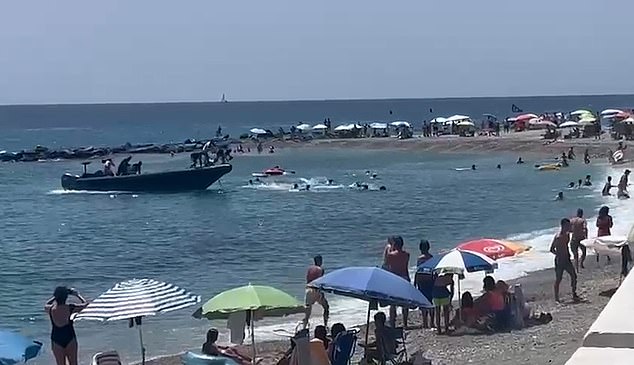
Video footage shows 13 Moroccan men jumping from a speedboat into the sea before running onto Sotillo beach
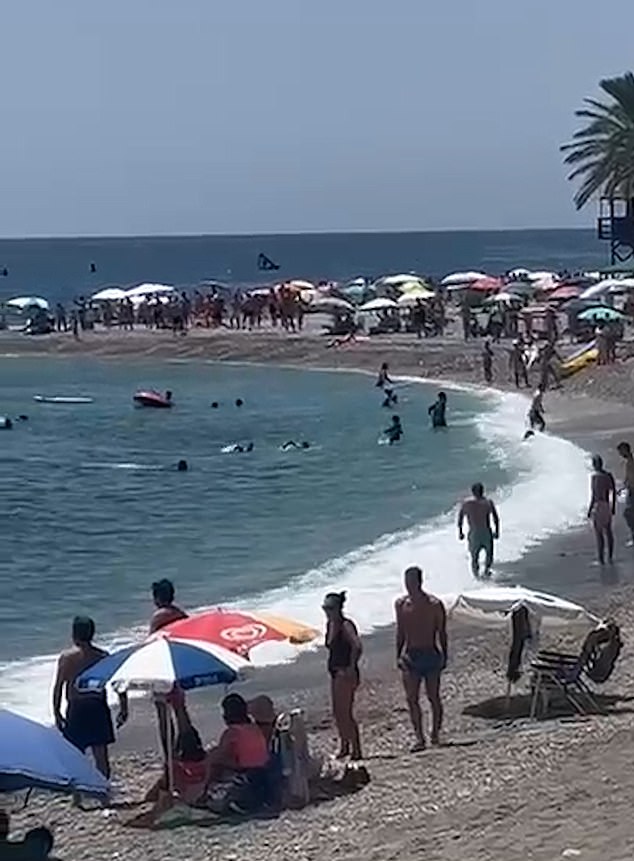
As the unwelcome visitors from north Africa tried to make a run for it, they were rugby tackled to the ground by ordinary holidaymakers in swimming trunks
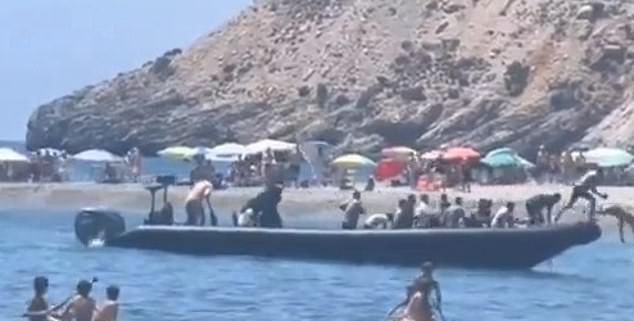
They were then held until police arrived to arrest them. The Daily Mail has revealed that the nine men who were detained were whisked off to a police station before being moved to a notoriously inhospitable secure unit
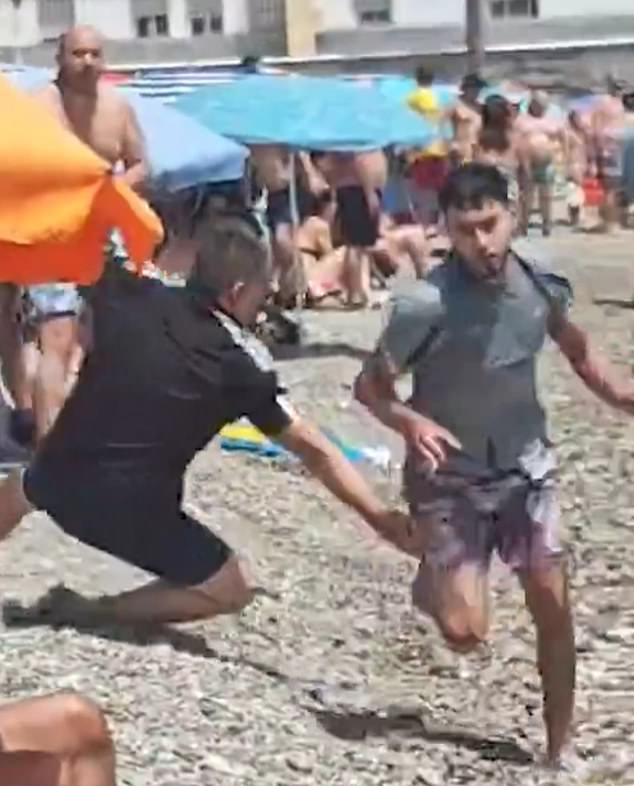
The Daily Mail has also been told that at least some of the bathers who were filmed detaining the men were off duty police officers who were enjoying a quiet Sunday on the beach
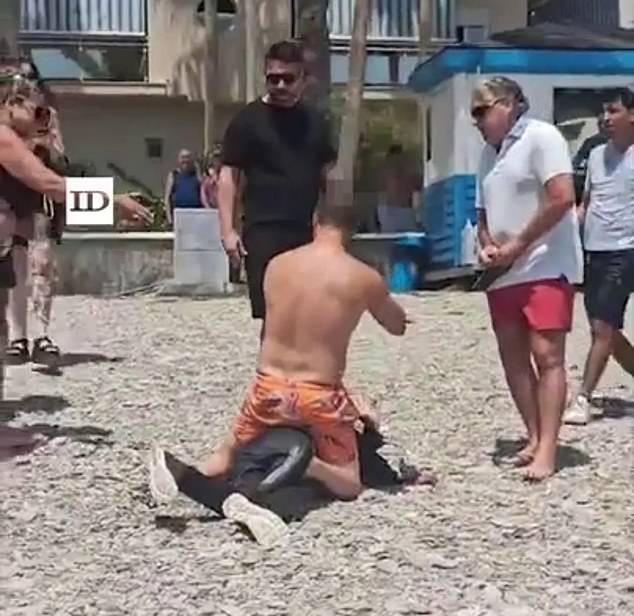
Pictured: Granada bathers hold back disembarked immigrants on Sotillo beach in Castell de Ferro
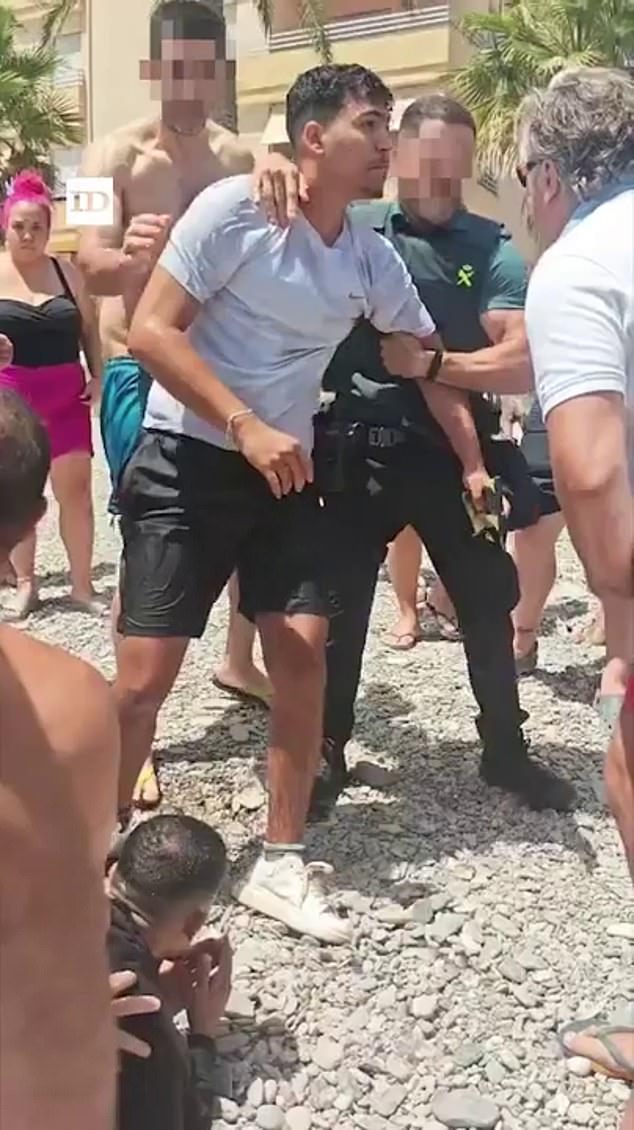
The no-nonsense Spainish approach to illegal immigration means the men face being returned to Morocco within a matter of weeks
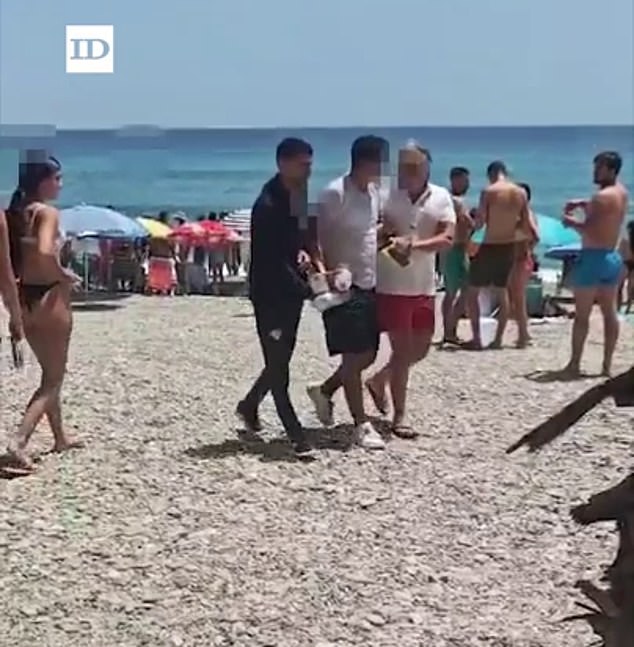
The group in Spain are effectively being held behind ten-foot fences surrounded by floodlights and security cameras in the Centre for Migration and Repatriation, known as a CATE
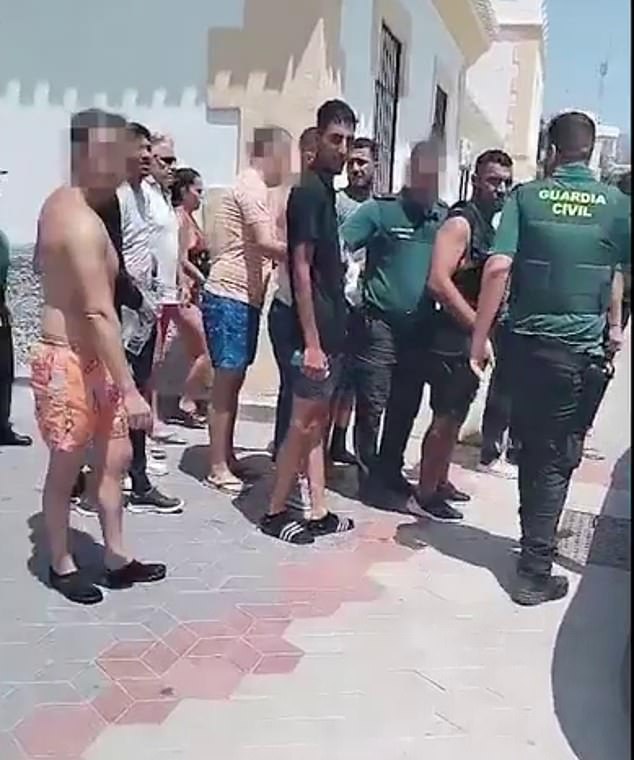
CATE opened in April this year in the port of the nearby coastal city of Motril
But Spain’s tougher approach has paid off with the number making the perilous voyage to the Granada area slumping in recent years, meaning that so far only 29 migrants have been housed in the unit since it opened, including the most recent nine.
The boat which carried them on Sunday is only the second this year to have reached the 47-mile-long Costa Granadina, known as Costa Tropical, and famed for its glorious beaches.
José Antonio Montilla Martos, the Spanish Government’s sub-delegate in Granada, confirmed the nine migrants would remain at the CATE ‘while their expulsion order from the national territory is processed.’
Their return to Morocco means that they will potentially be left thousands of euros out of pocket after paying the people smugglers who transported them on their doomed trip to Europe.
The Spanish authorities are known to regard Morocco as a safe country, meaning any asylum applications made by the men are likely to fail unless they can prove they have suffered political persecution or discrimination on LGBT grounds.
A port worker at Motril who asked not to be named said: ‘They deserve to be locked up until theycan be sent home. They are men who we know nothing about, and they should not be allowed to walk around our streets.
A port worker at Motril who asked not to be named said: ‘They deserve to be locked up until they can be sent home. They are men who we know nothing about, and they should not be allowed to walk around our streets.
‘They are being well fed and looked after in the CATE. It is proper that they remain there until they get home. Hopefully, they will tell others that it is a waste of time and money trying to get into Spain illegally.’
When told of the system in the UK where asylum seekers can walk freely around towns and cities while staying in hotels, the worker said: ‘That is crazy. They should be kept in a secure place.’
The opinion was echoed by locals in Castell de Ferro who witnessed the high-powered boat bringing the migrants ashore at around 1.30pm last Sunday when the beach was full of mainly Spanish families sheltering under umbrellas from the fierce midday sun.
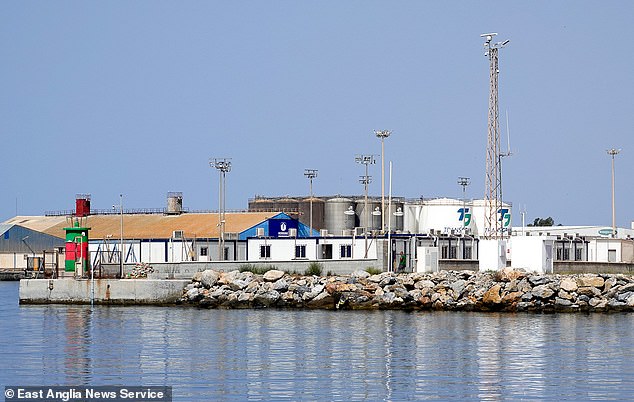
The CATE facility (pictured) replaced an older one which had rows of tents to accommodate seized migrants when many more were crossing the Mediterranean and arriving in southern Spain
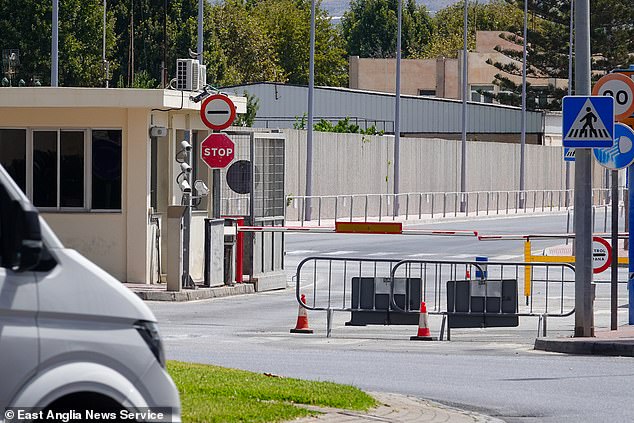
So far only 29 migrants have been housed in the unit since it opened, including the most recent nine. Pictured: The guarded entrance to the port of Motril, Spain
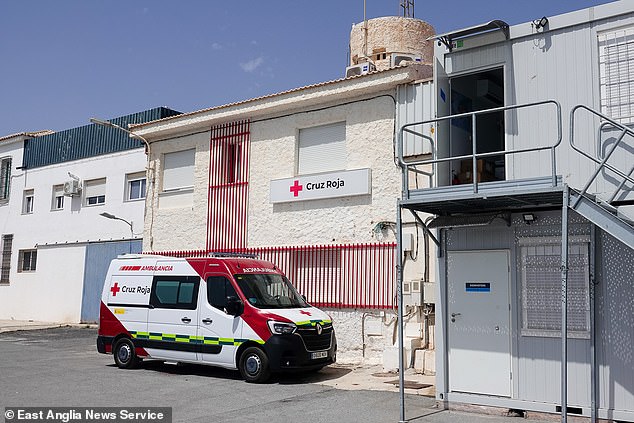
Pictured: The office of the Red Cross next to the CATE secure migrant detention centre which the charity helps to run in the port of Motril, Spain
Shocked witnesses described a ‘surreal’ scene as the boat approach at high speed, and stopped just a few metres from the shore before the migrants jumped off and swam to dry land.
Alberto Garcia, who owns the beachfront Mare Nostrum restaurant, told the Daily Mail: ‘It was a normal day, and we were providing service as usual when we suddenly saw the smuggling boat arrive and people jumping into the sea.
‘The police arrived quickly on the beach and there were swimmers who helped to catch the people on the boat. I think it is right that they should be detained. My opinion is that they should be deported once they step on Spanish territory illegally.’
Describing the scene as the boat arrived, he added: ‘We thought it was a recreational boat, but when we saw them starting to throw objects into the water and people getting out, we realised it wasn’t normal.
‘What surprised us most was that the boat was moving very slowly, as if they weren’t in a hurry or afraid. ‘They went in where there were most people, as if nothing had happened, and stopped close to the shore. Then they jumped off one by one, and the four remaining on board, some of them hooded, calmly turned around and left.’ Juan
Manuel Peragon, 20, who is a lifeguard on the beach, said: ‘I have seen three migrant boats arrive in the four years I have worked here – but this was the first for a long time.
‘The boat had three big outboard engines so it could go really fast. It stopped around 20m from the shore and around a dozen people jumped off. The boat left again after just ten seconds and was never caught.
‘Unfortunately for the immigrants, they came ashore right beside the police station which is beside the beach.
‘As it was a Sunday, there were a lot of police on a day off who had gone down to the beach at that spot with their families. At least one of the guys who grabbed the men was an off-duty policeman.
‘We ran to help, but police in uniforms quickly arrived and detained everyone. It looks like the immigrants came here to work. They can get jobs on farms growing vegetables because they are prepared to work hard for less money.
‘But they are coming here illegally and there should be a tough system to deal with them and send them back. More needs to be done to tackle the Mafia gangs who operate the boats.’
Human resources student Fabiola Escolano, 20, from Granada who was also on the beach said: ‘People were running after the men and trying to catch them when they arrived. They did not want them to disappear.
‘Those who were detained were all taken to the Red Cross and are being dealt with in the correct way. There have been boats arriving here before – but they are not so common now. There were three which arrived at the same time early in the morning on December 21, 2023.’
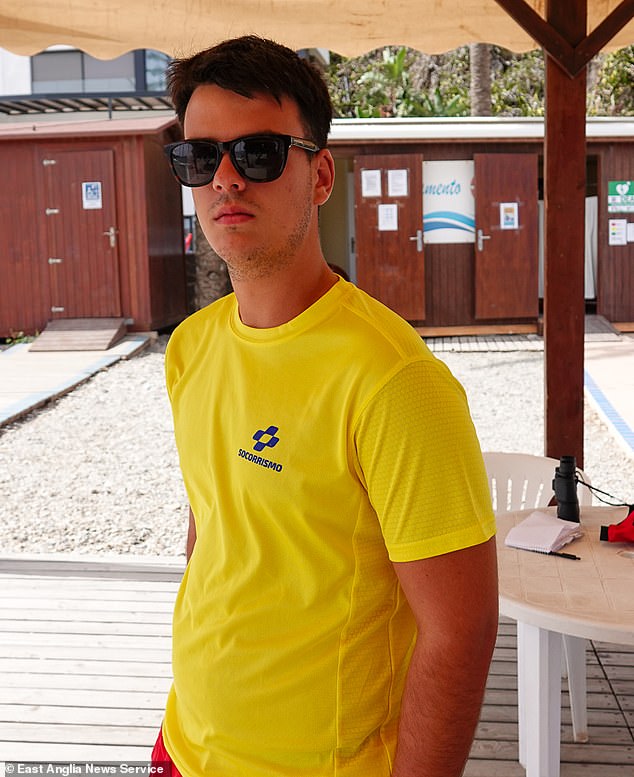
Pictured: Lifeguard Juan Manuel Peragon, 20, who witnessed migrants storming ashore from a boat at Castell de Ferro, Spain
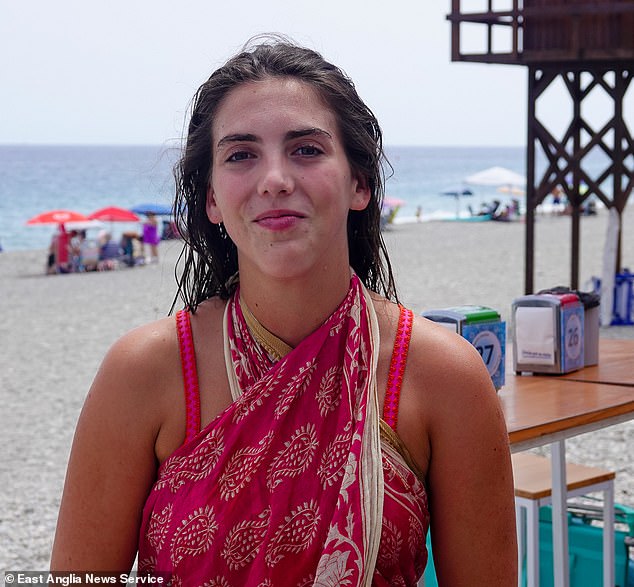
Fabiola Escolano, 20, who was on the beach at Castell de Ferro when migrants came ashore in a boat
Others on the beach felt more pity for the migrants including one filmed lying face down in the sand as he was subdued by a man in orange swimming shorts kneeling on his back.
One video clip featured a woman shouting: ‘Leave the kid alone! How shameless!’ The left leaning El Pais newspaper also criticised members of the public who had tried to detain the men, describing their actions as playing into the hands of the far right who had demonised migrants and others living legitimately in Spain.
Official figures reveal that more than 61,000 illegal migrants or asylum seekers entered Spain last year, slightly more than the previous year, with the majority heading by boat on the highly dangerous route from west Africa to the Canary Islands.
But the numbers leaving from Morocco for mainland Spain have fallen, in part due to the Moroccan authorities trying to keep would-be migrants away from coastal areas.
There has also been greater security around the Spanish enclaves of Ceuta and Melilla, on the northern coast of Morocco which migrants try and enter to get a foothold in Europe.
A further deterrent has been a clampdown on people smuggling gangs intent on bringing migrants and drugs into Spain.
Eight Spanish and Moroccan citizens in a ‘highly organised network’ which had allegedly used children to skipper boats to transport migrants from Morocco were arrested in June this year in Algeciras near Cadiz, Ibiza and Ceuta.
The gang is suspected of making about 2.8 million euros from charging more than 200 people 14,000 euros each to make the journey, although other sources suggested that the going rate was closer to 2,000 euros.
A statement by Europol, the EU’s law enforcement agency, said: ‘The network used minors as skippers in maritime smuggling operations, often recruited and trained by the organisation itself.
‘This fact not only highlights and amplifies the risk of accidents and fatalities, but also exposes vulnerable youngsters to exploitation and coercion. This practice illustrates the ruthlessness and dehumanising nature of criminal networks which priorities profits over human life.’
The gang is also suspected of simultaneously trafficking large amounts of cannabis into Spain.
As well as arresting the eight people, authorities seized 22kgs of cannabis, 50,000 euros in cash, five vehicles, two boats, weapons, electronic devices and navigation equipment.
Last year Spanish police also smashed a ring taking Syrian migrants through Lebanon to Algeria where they crossed the Mediterranean in overcrowded boats before being taken to unsanitary safe houses in Spain.
But right wing politicians in Spain demanded even tougher action to protect Spain’s borders following the beach landing this week.
Carlos Rojas Garcia, a former mayor of Motril and a People’s Party member of Spain’s Congress of Deputies since 2016, called for greater surveillance and security measures ‘to decisively combat the gangs that traffic in human beings’
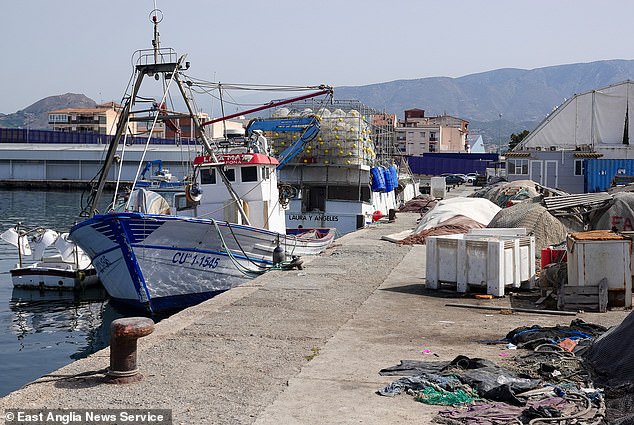
A view of boats and fishing equipment in the harbour in Motril, Spain, where migrants are held in a secure CATE detention centre
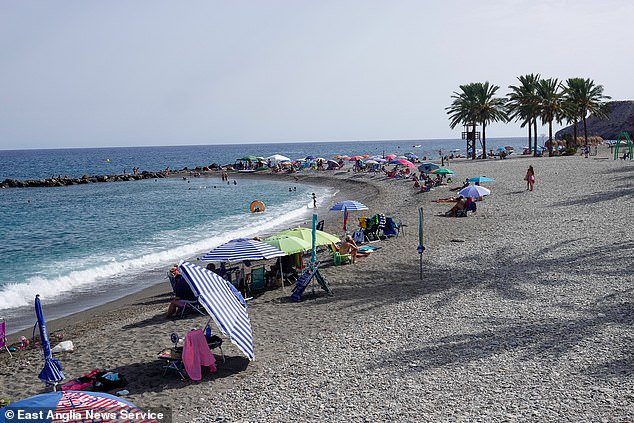
The part of the beach at Castell de Ferro where migrants stormed ashore after arriving in a boat from Morocco
He said: ‘The Spanish government cannot continue to look the other way while mafias operate with impunity on our coasts. ‘Images like those seen in Castell de Ferro are sad and worrying; they reflect how there are organisations that take advantage of desperate people who risk everything, even at the risk of losing their lives.’
The Granada MP called on the Spanish government to ‘urgently strengthen border control, provide more human and material resources for the State Security Forces and Corps, and intensify cooperation with the European Union.’
An organisation called Caminando Fronteras said it had recorded the suspected deaths of 1,865 migrants in 38 boats, including 112 women and 342 children, trying to reach Spain by sea from Africa in the first five months of this year.
The vast majority of those who died were trying to cross the Atlantic to the Canary Islands although 52 allegedly died while trying to cross the Strait of Gibraltar.











